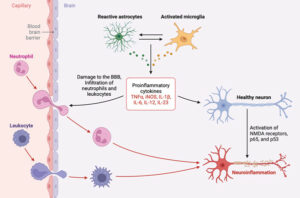To explore the hypothesis that low-grade neuroinflammation in the central nervous system can be part of the cardinal symptoms of ME/CFS. This can possibly be monitored in cerebrospinal fluid (CSF) as a result of the inflammatory reaction itself or as secondary markers of cell degradation and impaired cell repair mechanisms. Furthermore, we want to explore if the inflammation could be a result of or lead to increased intracranial pressure and reduced circulation.
Our study will be the first to systematically measure CNS structural abnormalities in a large ME/CFS case-control study using cerebrospinal fluid collection, in-situ measurement of intracranial pressure together with the study of microglia activation (the resident immune cells of the CNS) by the implication of a novel diffusion-based MRI methodology. Added to this will be collected biospecimens to perform extensive state-of-the-art analyses with the ambition to identify diagnostic and prognostic biomarkers.
The analysis of cerebrospinal fluid and matching plasma samples are IRB-approved and already initiated while the IRB review for the use of the novel MRI methodology will kick off shortly.
In Professor Jonas Bergquist’s laboratory, they have studied neuroinflammation and neurodegeneration for over three decades, and especially the in-depth analysis of cerebrospinal fluid has been a specialty. In 2010, the first evidence of low-grade inflammation was presented in ME/CFS patients and has since then been part of the focus for the continuous search of the pathomechanism underlying the disease. In the last couple of years, Professor Bergquist has been the supervisor of Björn Bragée (MD and head of the Bragée Clinic, Stockholm) and has been investigating, in close collaboration, the molecular features of cerebrospinal fluid from ME/CFS patients.
The overall aim is to explore the hypothesis that low-grade neuroinflammation, microglia activation, deranged flow of the cerebrospinal fluid (CSF), and deranged intracranial pressure (ICP) could explain the cardinal symptoms of ME/CFS. If this hypothesis proves true, it opens a new research area in ME/CFS and hopes for effective treatment to reduce neuroinflammation, regulate ICP, and relieve symptoms associated with ME/CFS. This study will make use of CNS imaging and analysis of CSF and blood samples and will identify proteomic and metabolomic biomarkers of the disease, a highly needed tool in the diagnostic and prognostic process. Through a combination of more detailed clinical examination, evaluation, and multiOmics biomarker analysis, we will be able to provide more individually adapted care and, hopefully, a cure.

OMF is a non-profit 501(c)(3) organization
(EIN# 26-4712664). All donations are tax-deductible to the extent allowed by law.



Open Medicine Foundation®
29302 Laro Drive, Agoura Hills, CA 91301 USA
Phone: 650-242-8669
info@omf.ngo
Copyright © 2023 Open Medicine Foundation. All Rights Reserved.
What are the advantages of giving from your Donor Advised Fund (DAF)?
How do I make a donation through my DAF?
Just click on the DAF widget below. It is simple and convenient to find your fund among the over 900 funds in our system.
Still can’t find your fund?
Gifting of Stock
Broker: Schwab
DTC #: 0164
Account #: 47083887
Account Registered as:
Open Medicine Foundation
29302 Laro Drive
Agoura Hills, CA 91301
Please speak to your personal tax advisor and then email or call OMF at 650-242-8669 to notify us of your donation or with any questions.